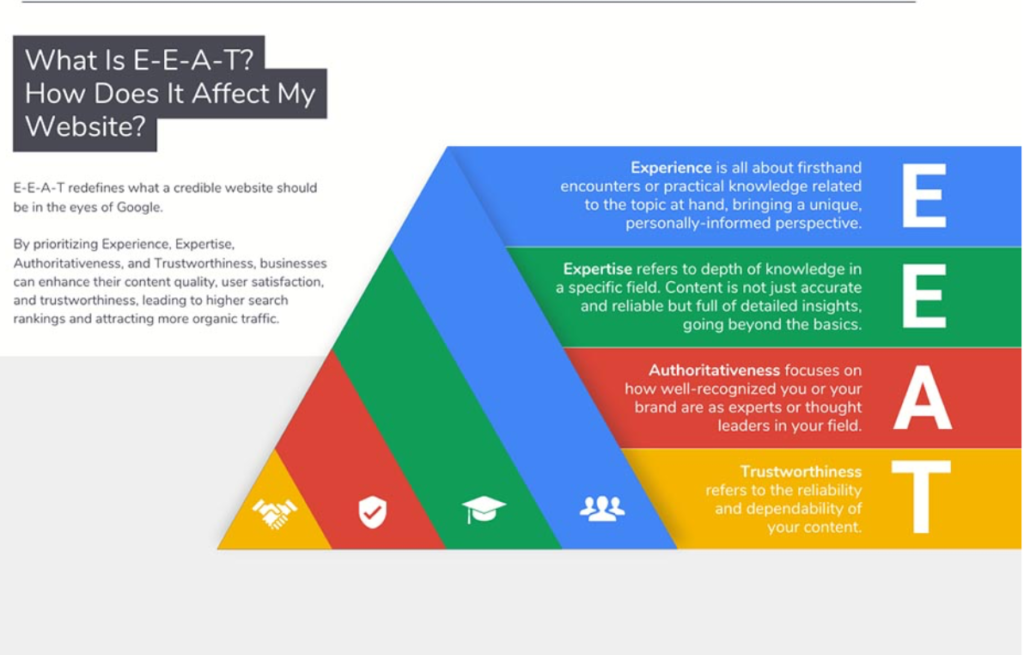In the age of digital media, understanding how to establish authority is essential for any online business looking to boost their online presence. This well-known metric referred to as DA can significantly impact how users perceive and understand your brand and can seriously impact search engine rankings.
In this article, our Serpzilla experts will delve into how to create digital authority using a number of strategies, including things like search engine optimization (SEO), social media marketing, content marketing, and finally Google ad campaigns. We will also explore the differences between E-A-T and E-E-A-T, the role of E-E-A-T in website content, and types of content that optimize using E-E-A-T principles.
Understanding The Impact Of Organic SEO
As will already be known by most reading this article, Search engine optimization (SEO) is fundamental in establishing lasting digital authority. By improving your site’s visibility on search engines results pages, you will naturally attract organic traffic, which is more than likely to convert some people into more loyal customers. Some of the key SEO strategies including:
1. Keyword Research and Optimization: Fully Identify and target keywords that are relevant to your industry. Use these keywords naturally and organically within your content to help search engines such as Google to understand your page’s context.
2. Quality Content: Focus on the creation of high-quality, informative, and engaging content that addresses the ongoing needs and queries of your audience. This content should be regularly updated to maintain industry relevance.
3. Backlink Building: Focus on earning backlinks from reputable sites. These will act as endorsements, showing search engines that your site is both trustworthy and a significantly valid source of information.
4. Technical SEO: Ensure your website is technically okay and has things such as fast loading speeds, mobile-friendliness, and secure connections (HTTPS). This also ensures a smoother user experience.
Social Media and Content Marketing
Social media and content marketing are the optimal tools for building digital authority. They allow you to engage with your audience in a more direct sense, share valuable information, and establish your brand’s own personalized voice.
1. Engagement: Remember to actively engage with your audience through comments, messages, and regular posts on social media platforms. Responding to queries and participating in discussions builds trust and authority and shows a proactivity towards customer service.
2. Consistent Branding: Focus on the maintenance of a consistent brand voice and image across a variety of social media platforms, and on your website. Consistency will help in creating a recognizable brand identity that is considered reliable.
3. Content Strategy: Develop a content strategy that includes a multitude of media types -t things like blog posts, videos, infographics, and social media updates. Each piece of content should provide value and reflect your expertise in your industry clearly.
Impact Of Paid Ad Campaigns
Whilst the more organic elements of SEO are essential for success, paid advertising campaigns on Google can also be a great way to bolster your digital authority in a clearer sense. Google Ads allow you to target specific audiences and appear at the top of search results, increasing visibility and credibility.
1. Targeted Ads: Use Google Ads to target specific keywords and demographics relevant to your business. This ensures your ads reach the right audience.
2. Ad Quality and Relevance: Put your effort into the creation of high-quality ads that are relevant specifically to the user’s search queries. Google tends to prioritize and reward ads that offer a good user experience with higher rankings and lower costs per click. A greater ROI and Google rankings!
3. Landing Pages: Make sure that your landing pages are optimized for potential conversions and provide the information promised in the ads, ensure it is easily accessible and displayed on your home page. This helps in building trust and authority.
Shifting From Google’s E-A-T vs. E-E-A-T

E-A-T: Expertise, Authoritativeness, and Trustworthiness
E-A-T, put simply, stands for Expertise, Authoritativeness, and Trustworthiness. These values are utilized by Google to assess the quality of web pages and the credibility of their content creators.
– Expertise: This properly demonstrates that the content is created by someone knowledgeable about the subject – an industry expert.
– Authoritativeness: This shows that the creator is recognized as an authority in their field and niche.
– Trustworthiness: This ensures that the content is reliable and can be trusted by users and search engines
E-E-A-T: Experience, Expertise, Authoritativeness, and Trustworthiness
Google has recently expanded their E-A-T to E-E-A-T, adding an extra “E” for Experience. This change underscores the transforming importance of the creator’s personal experience with the topic they are writing about. Thus, you must be keen to adopt the voice of industry experts.
– Experience: This validates that the content creator has first-hand experience or genuine knowledge of the subject matter and within the chosen niche
– Expertise, Authoritativeness, and Trustworthiness: These remain absolutely essential, with experience enhancing these attributes in a way that Google considers progressive.
E-E-A-T and Website Content
Learning how to fully incorporate E-E-A-T into your website content is key for establishing and maintaining digital authority in any sense. Here’s how you can align your content with these principles:
Types of Content for E-E-A-T
1. Blog Posts: Get experts to write and craft in-depth blog posts that demonstrate your company’s expertise and experience. Include things such as case studies, personal anecdotes, and detailed analysis to enhance credibility.
2. Testimonials and Reviews: Fully show off any testimonials and reviews from satisfied customers to build trust and authoritativeness. Customers will appreciate it and it will increase brand value.
3. Author Bios: Include more detailed author bios that highlight their qualifications, experience, and credentials in a way that can resonate with your audience.
4. Industry Reports and Whitepapers: Regularly publish and distribute comprehensive industry reports and whitepapers that showcase your expertise and authoritative knowledge.
5. Video Content: Create blogs, streams, or videos where experts get together to discuss relevant topics, share insights, or demonstrate products/services, showcasing their experience and expertise as a part of your site.
Optimizing Content Using E-E-A-T
1. Highlight Experience: When creating content, showcase the creator’s personal experience with the subject. This could be through storytelling, case studies, or practical demonstrations that can easily show experience.
2. Showcase Expertise: Ensure that your content is well-researched and includes factual information. Cite reputable sources and include data to back up claims. This will naturally position you as a trustworthy source.
3. Build Authoritativeness: Develop content that other authoritative sites will want to link to as it is naturally valuable. Engage in industry discussions and try your best to contribute guest posts to high-authority websites.
4. Enhance Trustworthiness: Be sure that your site has a clear and understandable privacy policy, following local data laws, providing contact information, and secure browsing (HTTPS). Be transparent about your business practices and consistently provide accurate information.
Conclusion
Building digital authority is a multi-faceted process that leverages SEO, social media, content marketing, and Google ad campaigns. By understanding and applying the E-E-A-T principles—experience, knowledge, authority, and trust —you can dramatically increase your website’s credibility and search engine rankings in creating high-quality, experience-driven content, communicating with your audience, and remaining transparent Focus and establish a strong digital presence that will stand the test of time



![90+ Best Fashion Keywords for 2025 [Research]](https://serpzilla.com/blog/wp-content/uploads/2025/07/90-Best-Fashion-Keywords-for-2025-540х360.jpg)


